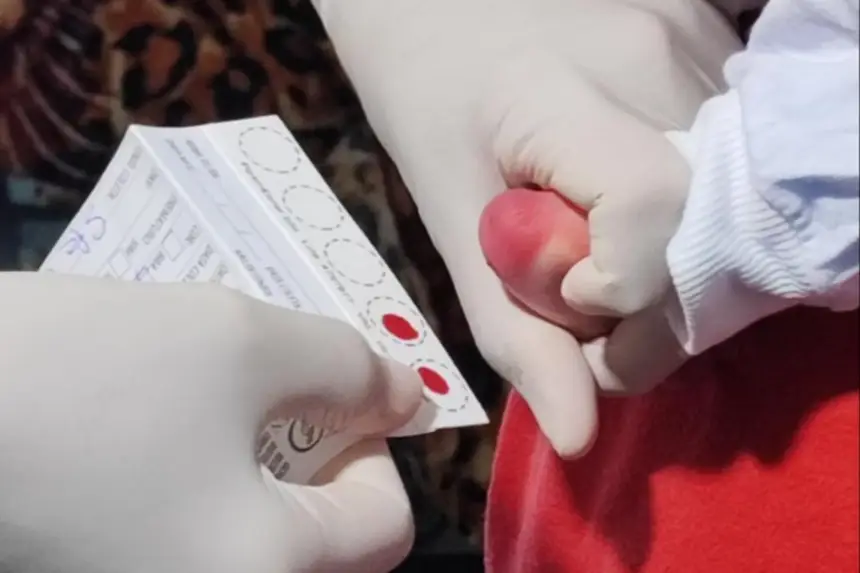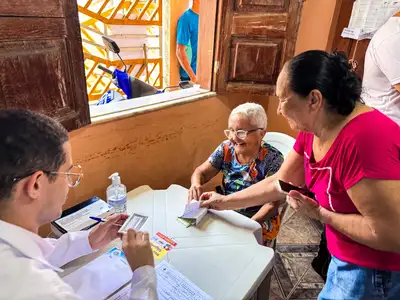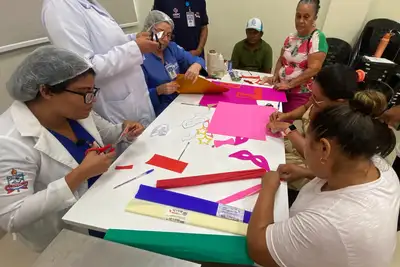Sespa reinforces the importance of the Heel Test for newborn health
The exam identifies several diseases in the first days of the baby's life
On this Friday (6), National Heel Test Day, the State Department of Public Health (Sespa) highlights the importance of the exam for the early detection of diseases that can severely compromise health and child development if not diagnosed and treated in time.
Implemented by the Unified Health System (SUS) 24 years ago, through Law No. 10.889/2001, the National Neonatal Screening Program (PNTN), better known as the Heel Test, allows, from a simple blood sample taken from the baby's heel, the identification of several diseases in the first days of life. Early diagnosis and treatment significantly reduce the risks of complications in children's growth and development.
Sespa emphasizes that the blood sample collection should be performed between the 3rd and 5th day of the newborn's life, the ideal period to ensure the accuracy of the exam and the effective detection of pathologies. All basic health units and maternity hospitals in the state must be qualified to perform this collection, which is subsequently sent to the State Central Laboratory (Lacen-PA), a reference in neonatal screening in Pará.
The state coordinator of Child Health, Ana Cristina Guzzo, explains that performing the test within the appropriate timeframe is essential. "Children with abnormalities in the exam are called for a new collection and, if necessary, undergo complementary tests, according to the identified pathology. Once the diagnosis is confirmed, they begin treatment with medications, specific formulas, and continuous monitoring by the reference service, usually for a period of two years," she details.
Expansion of the exam - Ana Cristina also emphasizes that Pará has fully met the first stage of Law No. 14.154/2021, which aims to expand the coverage of the PNTN by incorporating new diseases into the screening list. "The program has been divided into five stages. In the first, phenylketonuria and other hyperphenylalaninemias, congenital hypothyroidism, sickle cell disease and other hemoglobinopathies, cystic fibrosis, congenital adrenal hyperplasia, biotinidase deficiency, and now congenital toxoplasmosis are screened," she highlights.
According to Guzzo, the inclusion of congenital toxoplasmosis allows the state to meet 100% of the requirements of the first phase of the new legislation. "The stages have been structured progressively, and Pará has already achieved the entirety of the first stage," she reinforces.
Ongoing training - In addition to executing the program, Sespa also invests in the continuous training of health professionals in the municipalities. "We conduct training sessions to guide on proper collection, the functioning of the reference service, the screened pathologies, their manifestations, and the risks of sequelae if not treated in time," explains Ana Cristina.
Diseases detected in the first stage - The Heel Test allows for the identification of serious diseases that often do not present symptoms immediately after birth. Check below:
Congenital hypothyroidism is a hereditary disease that prevents the newborn's thyroid gland from producing the thyroid hormone T4. In young children, this hormone is essential, and its absence decreases metabolism, hindering physical and mental growth and development.
A person with phenylketonuria is born without the ability to properly break down molecules of the amino acid phenylalanine. The disease impairs the activity of the enzyme that processes phenylalanine into tyrosine. If untreated, it leads to intellectual deficiency, seizures, nausea, vomiting, eczema-like skin rash, and a characteristic body odor.
Sickle cell disease is characterized by the alteration of red blood cells, making them resemble a sickle, hence the name sickle-shaped. These cells have altered membranes and break more easily, causing anemia.
Cystic fibrosis or mucoviscidosis is characterized by the accumulation of denser and stickier secretions in the lungs, digestive tract, and other areas of the body.
Congenital adrenal hyperplasia refers to several genetic diseases caused by the deficiency of different enzymes in the synthesis of adrenal hormones. The disease affects the normal growth and development of a child.
Biotinidase deficiency is a rare genetic disorder characterized by the deficiency of the enzyme responsible for the absorption and organic regeneration of biotin, a vitamin found in foods of a normal diet.
Congenital toxoplasmosis occurs when the pregnant woman comes into contact for the first time with Toxoplasma gondii and acquires the infection. The parasite multiplies in the placenta and can infect the fetus, causing varying degrees of impairment, predominantly lesions in the central nervous system and retina.
The performance of the Heel Test, as emphasized by Sespa, is a right of every child and a shared responsibility between the health system and families, ensuring a healthier and more protected start to life.
Text: Suellen Santos - Ascom Sespa










